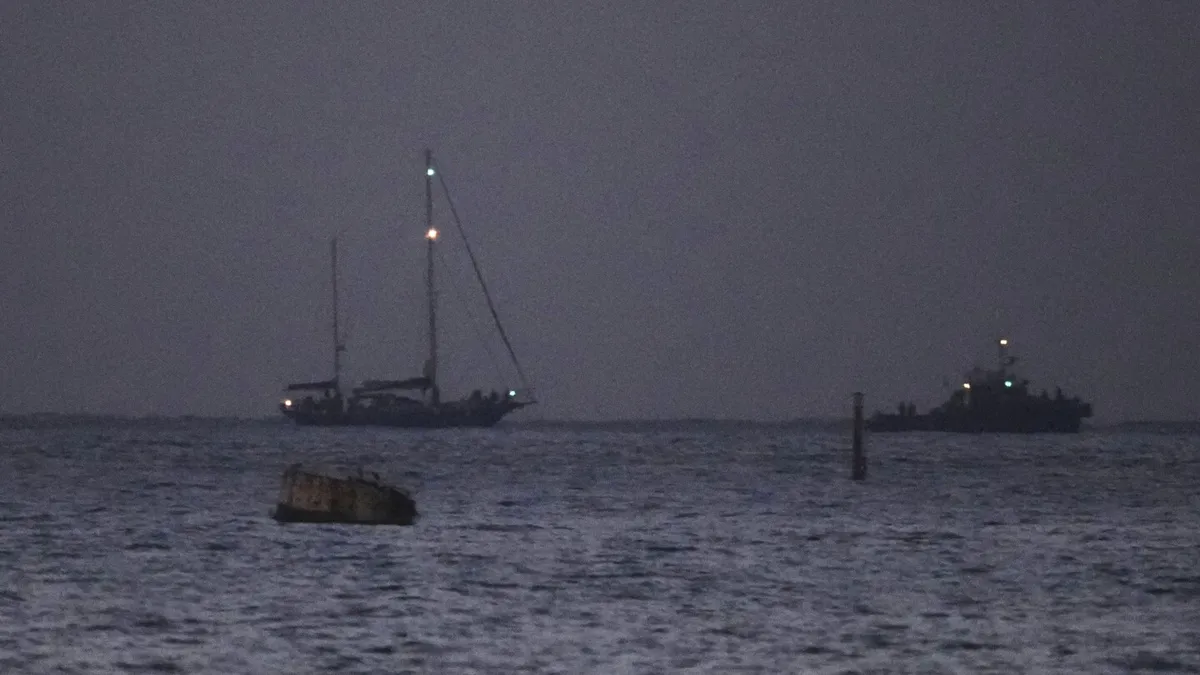
In a significant and controversial operation, Israeli naval forces intercepted and seized a Gaza-bound ship early Monday morning, which was carrying international activists, including prominent climate activist Greta Thunberg. This high-seas raid has ignited accusations that Israel's actions may constitute a breach of international law.
The activists aboard the ship were on a mission intended to protest Israel's ongoing military actions in Gaza and to draw attention to the humanitarian crisis affecting the region. The vessel was carrying essential aid supplies, including baby formula and food, destined for the people of Gaza. Following the interception, the activists were detained and are expected to be deported to Israel.
This incident is not isolated; it marks a continuation of Israel's history of halting ships attempting to deliver aid to the Palestinian territories. A notorious raid in 2010 resulted in violence between Israeli commandos and activists, leading to the deaths of eight Turkish nationals and one Turkish-American. While most other operations aimed at Gaza-bound vessels have concluded without violent encounters, the current situation raises critical questions about legality and morality.
Israeli officials assert that the seized ship was attempting to breach the blockade imposed on Gaza, claiming that their actions were in accordance with international law. However, the legality of such an interception in international waters remains a contentious issue.
The Freedom Flotilla Coalition, which organized this latest mission, claims that their ship, named the Madleen, was intercepted approximately 200 kilometers (124 miles) off the coast of Gaza. This assertion has not been independently verified, as Israeli authorities have not revealed the exact location of the seizure.
Robbie Sabel, an expert in international law and a former legal advisor to the Israeli Foreign Ministry, explained that the U.N. Convention on the Law of the Sea grants a state jurisdiction only up to 12 nautical miles (19 kilometers) from its shores. Generally, states do not have the right to seize vessels in international waters, barring certain exceptions, such as during armed conflict. Sabel indicated that Israel's ongoing conflict with Hamas provides a basis for its interception of ships suspected of violating its blockade.
Rights groups have long condemned the blockade as a form of unlawful collective punishment against Palestinians. Sabel referenced a U.N. report concerning the 2010 raid, which indicated that vessels attempting to breach a legitimate naval blockade put themselves and their occupants at risk. This ongoing debate about the legality of Israel's blockade remains unresolved among legal scholars.
Yuval Shany, an international law expert at Hebrew University in Jerusalem, stated that as long as Israel's blockade is "militarily justified" and aimed at preventing weapons from entering Gaza, the country can legally intercept vessels that intend to breach it. However, this militaristic justification itself is a topic of substantial debate.
Suhad Bishara, head of the legal department at Adalah, an Israeli legal rights organization representing the activists, contested Israel's right to act against a ship in international waters that posed no military threat. She emphasized that Israel cannot extend its jurisdiction into international waters and carry out actions against vessels there.
The legal complexities surrounding this incident are further compounded by the unique status of Gaza. The United Nations and a significant portion of the international community regard Gaza as an Israeli-occupied territory, alongside East Jerusalem and the West Bank, all of which Israel captured during the 1967 Mideast war. The Palestinian leadership aspires for these territories to form the basis of a future state.
Israel contends that it withdrew from Gaza in 2005, removing its soldiers and settlers, yet it maintains control over Gaza's coastline, airspace, and most land borders. Following this withdrawal, Hamas seized control of Gaza two years later, complicating the region's political dynamics.
Human rights organizations such as Amnesty International assert that Israel has an obligation as the occupying power to ensure that Palestinian residents in Gaza have sufficient access to humanitarian supplies. Amnesty claims that Israel's interception of the Madleen is part of a broader effort to restrict or deny aid to Gaza during the ongoing war.
Israel maintains that it has allowed adequate humanitarian aid into Gaza to sustain the population, accusing Hamas of diverting this aid for its own purposes. However, various U.N. agencies and aid organizations dispute these claims, asserting that there has been no systematic diversion of aid. Critics argue that Israel's aid policies during the conflict have pushed Gaza towards famine, with Prime Minister Benjamin Netanyahu facing accusations from the International Criminal Court of employing starvation as a method of warfare, charges he has strongly denied.
Following the interception of the Madleen, Agnès Callamard, Amnesty International's Secretary General, stated, "By forcibly intercepting and blocking the Madleen, which was carrying humanitarian aid and a crew of solidarity activists, Israel has once again flouted its legal obligations towards civilians in the occupied Gaza Strip." The organization is calling for the immediate and unconditional release of the detained activists, asserting that they were engaged in a humanitarian mission.